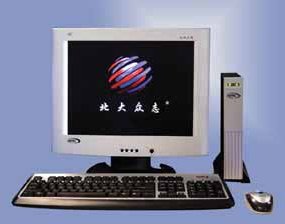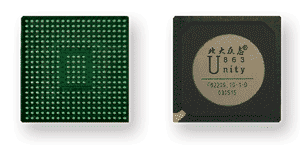Chinese SoC powers Linux-based NC
Jul 10, 2007 — by LinuxDevices Staff — from the LinuxDevices Archive — 4 views A company in China is selling network computers (NCs) based on an SoC (system-on-chip) of its own design. Beijing Peking University Unity Microsystems Technology Co. (PKUnity) says its PKUnity NC runs Linux on a Unity-863 CPU, built around a “self-developed” Unicore32 processor and Unicore-F64 FPU (floating point unit).
A company in China is selling network computers (NCs) based on an SoC (system-on-chip) of its own design. Beijing Peking University Unity Microsystems Technology Co. (PKUnity) says its PKUnity NC runs Linux on a Unity-863 CPU, built around a “self-developed” Unicore32 processor and Unicore-F64 FPU (floating point unit).
 The PKUnity NC (pictured at right) runs a Linux OS, along with applications hosted on a central server running Linux or Windows Server 2000/2003. The NC is said to be “stateless,” with all configuration information stored on the central server.
The PKUnity NC (pictured at right) runs a Linux OS, along with applications hosted on a central server running Linux or Windows Server 2000/2003. The NC is said to be “stateless,” with all configuration information stored on the central server.
Other touted NC features include:
- VESA monitor support
- 256 (8-bit) or 65,536 (16-bit) color
- Up to 1280×1024 at 8 bits
- Up to 85 Hz non-interlaced refresh rate
- PC-104 keyboard
- PS/2 wheel mouse
- High speed 16C550-compatible serial port, up to 115.2 KBaud
- Parallel printer port (bi-directional Centronics-compatible)
- 10/100Base-T fast Ethernet
- TCP/IP with DNS and DHCP
- Configurable automatic login
- Remote management, configuration, and upgrades through server-side software
Unity-863 SoC
The Unity-863 SoC is apparently named for China's “National 863 Program,” which funds thousands of scientific pursuits, from the sequencing of rice DNA to medical robots allegedly capable of performing brain surgery. In addition to network computers, it targets network terminals for government, business, and education, and has apparently been used in a home gateway and VoIP phone design.

PKUnity-863, top and bottom
The Unity-863 SoC is built on 0.18 micron process technology, and clocks to 300MHz, according to PKUnity. The chip is based on a Unicore32 processor core built around a Harvard Architecture, with a 5-stage pipeline. The core is said to support both 32- and 16-bit instructions, along with “improved” DSP instructions.
The SoC also integrates a Unicore-F64 co-processor, a 64-bit FPU (floating-point unit) said to comply with the IEEE 754 standard for binary floating-point arithmetic.
Other touted Unity-863 SoC features include:
- High-speed cache
- MMU (memory management unit)
- JTAG on-chip debugger
- On-chip system bus
- PCI bus bridge controller
- 10/100M Ethernet MAC controller
- External memory controller supporting flash, ROM, and PC133 SDRAM
- General-purpose system control module
- Peripheral controller module
The Unity-863 supports both Linux 2.4 and Linux 2.6. Michael Ning Qu, a Carnegie-Mellon University researcher who helped port Linux to the chip and write a full-system simulator, said that PKUnity completed a 16-bit version of the chip in 1999, followed by a 32-bit processor in 2000. He added, “For the complete SoC, our first chip which was silicon validated was at the end of 2002.”
Other Chinese chips aimed at thin-client and network computing devices include the 666MHz Loongson 2E processor and the 500MHz Godson-II, both built on a MIPS64-like architecture.
Availability and pricing details for the PKUnity NC and Unity-863 were not disclosed.
This article was originally published on LinuxDevices.com and has been donated to the open source community by QuinStreet Inc. Please visit LinuxToday.com for up-to-date news and articles about Linux and open source.